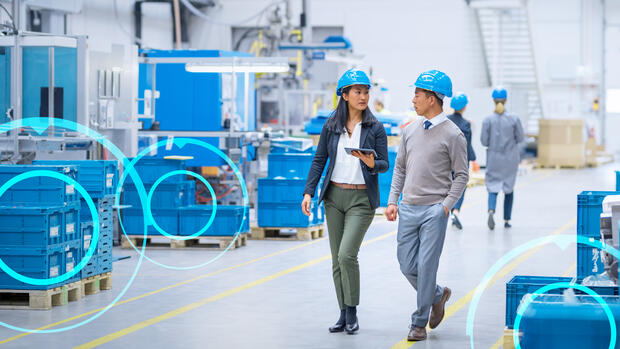Munich, Dusseldorf Permanently installed machines in factories are now largely digitally networked with each other. “It’s a completely different story when it comes to moving assets such as robots, tools and containers, right through to components,” says Oliver Trinchera, founder of the automation specialist Kinexon. Such parts made up 99 percent of things in the factory.
Trinchera says there is still a great need for further automation and process optimization here, also due to the lack of skilled workers and the urge for more sustainability. Kinexon has developed a kind of operating system for these moving things in production. It is already being used in the BMW factories and at more than 100 other customers. Now the start-up and SAP want to roll this out together in a far-reaching cooperation.
The fixed machines are usually connected to a program that controls and monitors the manufacturing process from raw material to finished product. In technical jargon, the Manufacturing Execution System (MES) is used. The equivalent for the movable things from Kinexon is now to be integrated into the SAP world and also distributed with the software company.
The material flow is simulated in the digital twin
“SAP orchestrates the business processes, we orchestrate operations in the factories,” says Kinexon founder Trinchera. His company expects additional double-digit million sales from its role as preferred partner.
With the help of the operating system, so-called digital twins can be generated. The process in the factory is therefore simulated on the computer. This makes it possible, for example, to analyze how busy a transport device is and how well the material flows in production are working.
“We also enable paperless production,” says Trinchera. Until now, for example, the arrival of transport containers often had to be entered manually into an SAP system by employees a thousand times a day. “We then post that fully automatically.”
“SAP orchestrates the business processes, we orchestrate the operations in the factories.”
(Photo: Kinexon)
The alliance is an example of how partnerships are becoming increasingly important in the digitization and automation of industry. Even large providers could not enforce closed operating systems that they alone control, and are therefore increasingly relying on cooperation and open interfaces.
Working with companies like Kinexon has become enormously important for SAP in recent years. The software manufacturer has opened up to partners to build an ecosystem, product director Thomas Saueressig told Handelsblatt. “We are addressing more industries – our portfolio is broader and deeper than ever before.”
The Dax group develops standard software such as S/4 Hana Cloud for business processes or the Digital Manufacturing Cloud for production. Partners, often from the start-up world like Kinexon, provide special applications via interfaces.
BMW and Deutsche Telekom are strategic partners
The goal: if partners develop special programs, the software manufacturer can better focus its capacities. “What is important for us as a company is that we are the spider in the web when it comes to strategic issues,” said SAP board member Saueressig. The software manufacturer should be at the center of the ecosystem and drive innovation.
The Munich company Kinexon has found another well-known partner for its industrial division. Last year, BMW and Deutsche Telekom joined the company as strategic investors.
On the one hand, Kinexon has developed chip technology. This can be used to determine where a forklift is located in the plant, for example, and robots and driverless transport vehicles can be controlled.
The company also offers a cloud-based “Internet of Things” operating system. All machines and things that move can be connected to it. The production can then be displayed and optimized in a digital twin. Kinexon is thus competing in some areas against industrial automation companies such as Siemens with its Mindsphere platform, Bosch IoT or PTC Thingworx.
“Our portfolio is broader and deeper than ever before.”
(Photo: SAP)
Kinexon has become known above all for its sports activities: the chips are integrated into chips and balls in numerous teams and sports. Top clubs from all over the world use the data obtained to analyze the players’ routes and moves and optimize their training. At the World Cup, FIFA used the technology to make it easier for referees to make decisions.
Kinexon, founded by Oliver Trinchera and Alexander Hüttenbrink, is one of the most promising German start-ups. In the last round of financing, the company raised $130 million and is now solidly financed.
According to industry estimates, sales last year should have been in the mid double-digit million range. Because of the switch to the “Software as a Service” model, which is now common in the software industry, it was not higher. One-time license sales are replaced by regularly incurred fees.
About two thirds of the sales are attributable to the industrial business. The growth opportunities here are great. In view of the disrupted supply chains during the corona pandemic and the Ukraine war, many companies are bringing production back closer to home. However, this is only possible with a higher degree of automation for cost reasons and because of the shortage of workers. “This is a must if you still want to be competitive tomorrow,” says Trinchera.
More: This is how artificial intelligence is revolutionizing the industry
